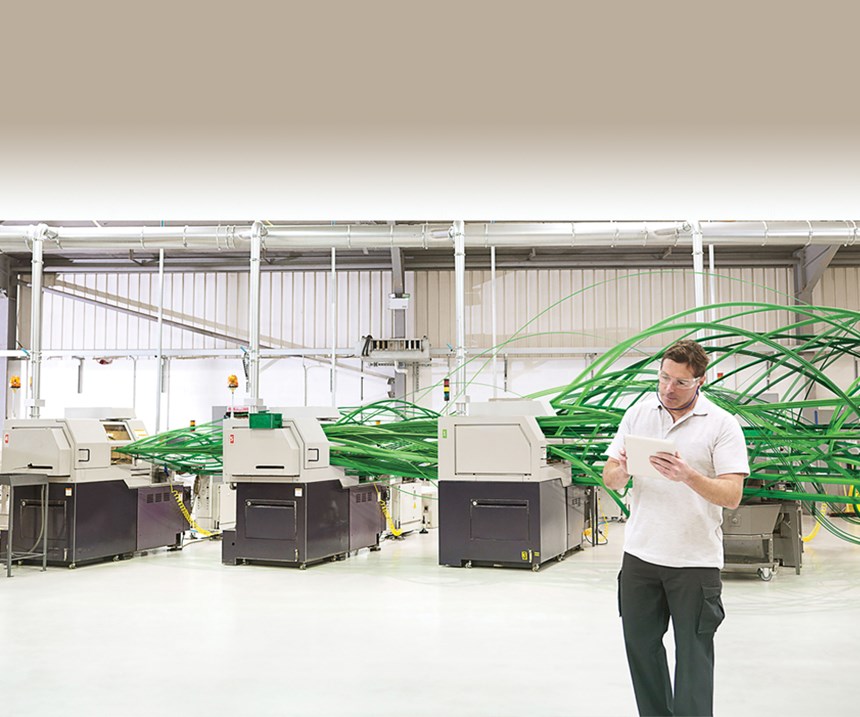Metalcutting Fluids Fight Microbial Contamination
Metalcutting fluids have always been vulnerable to microbial contamination, but new formulations address that problem.
Metalcutting fluids were once regarded as a commodity item playing an essential or even a lowly part in the production process, but not anymore. The fluids are now recognized as a key element in improving efficiency, extending tool life and keeping costs in check.
The fluids’—traditionally oil- and water-based—smooth production processes involve anything from grinding to broaching. They provide essential lubricity while easing the process of clearing metal chips and debris from the cut area.
However, like anything created to aid with a machining process, problems can arise with metalcutting fluid as well.
Fungal Infections
Metalcutting fluids have always been vulnerable to microbial contamination. When unchecked, the contamination causes fluids to become rancid. A poorly managed fluid with high levels of bacterial and fungal infection loses its effectiveness, and the contamination creates an acidic environment that causes emulsions to separate and lose their lubricating properties, potentially resulting in corrosion. Side effects include bad odors and, more importantly, added safety hazards for staff because of the addition of boron or formaldehyde-releasing agents required to treat the fluid. Therefore, operators face increased fluid consumption and the need to use anti-microbial additives.
Unfortunately, bacteria and fungi grow easily in warm, humid environments such as a coolant sump, and poor working practices can accelerate the spread of contamination. Many operators reluctantly accept that metalcutting fluids must be continually monitored in order to keep them within specification. Good fluid management is time- and cost-intensive. Any improvements to fluid management have the potential to make a difference to the bottom line.
The Boric Acid Effect
Traditionally, microbial degeneration has been kept in check by use of boron or by formaldehyde-releasing agents. Boron extends cutting fluid life by slowing the development of bacteria, allowing the fluid to be more inherently stable. It is also an excellent corrosion inhibitor.
However, the presence of boron produces boric acid, which is a poison. Therefore, organizations such as the European Commission have ruled that metalworking fluids with a boric acid concentration equal to or more than 5.5 percent must be labeled and treated as hazardous substances. Formaldehyde-releasing agents also need to be treated with caution, as they, too, have become the focus of health and safety regulations.
A ‘Step Change’ in Technology
Castrol researchers have been focusing on the problems generated by traditional bacterial and fungal contamination controls for the past five years. The result is a “step change” in fluid technology, which the company says has allowed the development of a technique to help stop microbial degradation.
The company says its new Hysol SL 35 XBB and Alusol SL 51 XBB are boron-free, mostly eliminating the need for expensive additives. XBB products have been formulated with a long-lasting buffer that is more resistant to changes in acidity and is inherently more resistant to bacterial growth, according to Dr. Rudi Jenner, global product manager for cutting fluids at Castrol.
Banishing the Bugs
The technology behind the fluids uses a dual-action chemical buffer to reduce changes in the fluid’s acidity (pH value). “By keeping the pH where it should be for longer and delivering resistance to bacterial growth, we can extend oil life and reduce the need for intervention,” Dr. Jenner says. “These Alusol and Hysol fluids remain stable over a range of water hardness (100 to 800 ppm CaCO3) and may therefore eliminate the need for demineralized water,” he says.
Longer for Less
Castrol says by cutting the amount of additives needed and by extending the intervals between maintenance interventions, XBB technology really does mean operations can run longer, for less. “They can remain effective for longer than conventional machining fluids, because the formulations are inherently more resistant to changes in pH due to microbiological breakdown,” Dr. Jenner says. He says this has been proven in lab tests and seen in real production conditions. “But, equally important, the staff will enjoy improved working conditions, and the fluids also comply with current and foreseeable health and safety requirements that limit the use of boron and formaldehyde biocides.” These cutting fluid advancements translate to significant improvements for controlling manufacturing costs, increasing productivity and protecting the quality of end products, according to Dr. Jenner.
For additional information from Castrol Industrial Inc., visit castrol.com.
Sidebar: Cutting Fluid Specifications
Castrol’s Hysol XBB is a family of soluble or semi-synthetic cutting fluids formulated to help protect machine tools and produce a high quality finish when machining ferrous alloys. The fluid maintains system performance and fluid life, neutralizing as much as 24 percent more acidic material than standard cutting fluids (based on titrating seven fluids until a pH of 8.5 is reached), according to the company. This reduces, and can even eliminate, the need for biocide additives and overall fluid top-up volumes. According to a Castrol customer, switching from a standard cutting fluid, Hysol SL 35 XBB saved them 45 percent in overall fluid top-ups. Maintaining pH levels and controlling the growth of bacteria minimizes the propensity for corrosion or rust staining on finished components. Also, Hysol SL 35 XBB’s wetting properties help keep machines and parts clean.
Alusol XBB is a family of soluble cutting fluids designed to improve precision performance in aluminum machining. Fine aluminum chips can build up at the cutting edge, causing component quality issues from the first cut. The fluids combine Castrol’s non-stick additives with its new metalworking fluids technology, acting in tandem to reduce aluminum build-up at the tool and to neutralize up to 33 percent more acidic material than standard aluminum cutting fluids (based on titrating nine fluids until a pH of 8.5 is reached). Using this fluid can reduce or eliminate the need for biocide additives. Based on the experiences of four customers switching from standard aluminum cutting fluids, this cutting fluid formulation can save as much as 30 percent in overall fluid top-ups.
Alusol SL 51 XBB maintains a high surface quality for precision cutting, minimizing the need to rework or scrap output that has to be rejected. It, too, has excellent wetting properties to help keep machines clean and helps the cutting edges stay free from buildup, the company says.
Related Content
Automate Coolant Management, Collect Data to Optimize Machining Operations
The future of coolant management lies in better control through automation and applying real-time data analysis and insights.
Read MoreHennig Inc. Acquires Industrial Coolant Systems
ICS develops and field tests high-pressure coolant systems, coolant filtration systems and other machine tool solutions.
Read MoreFluidLynx Offers Intelligent Cooling Lubricant Automation
PMTS 2023: Motorex’s FluidLynx automated fluid management system offers controllable and traceable process reliability, while better protecting workpieces and machines, and optimizing tool life.
Read MoreMarubeni Citizen-Cincom Accessories Provide Faster Cycle Times
IMTS 2024: Marubeni Citizen-Cincom is showcasing a range of machining accessories designed to work intuitively with Citizen machines.
Read MoreRead Next
Metalworking Fluids Address Increasing Demands
This line of metal removal emulsion technology products offers end users of metalworking fluids a defined selection of choices to suit their specific needs for process efficiency and lower total cost of ownership.
Read MoreA Tooling Workshop Worth a Visit
Marubeni Citizen-Cincom’s tooling and accessory workshop offers a chance to learn more about ancillary devices that can boost machining efficiency and capability.
Read MoreEmerging Leaders Nominations Now Open
Here’s your chance to highlight a young person in your manufacturing business who is on the path to be a future leader moving your company forward.
Read More








.jpg;maxWidth=300;quality=90)













